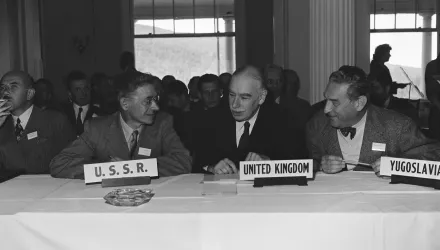International Security is America's leading peer-reviewed journal of security affairs.
Summary
Bargaining models of war suggest that war ends after two sides develop an overlapping bargaining space. Domestic mechanisms—domestic governing coalitions, a state’s elite foreign policy decisionmaking group, and their role in ending interstate war—are critical in explaining how, when, and why that bargaining space develops. Through preference, information, and entrapment obstacles, wars can become "stuck" and require a change in expectations to produce a war-terminating bargaining space. A major source of such change is a shift in belligerents’ governing coalitions. Events in the United States, China, and the Soviet Union during the Korean War illustrate the dynamics of these obstacles and the need for domestic coalition shifts in overcoming them before the conflict could be brought to an end.
Stanley, Elizabeth A.. “Ending the Korean War: the Role of Domestic Coalition Shifts in Overcoming Obstacles to Peace.” Summer 2009



